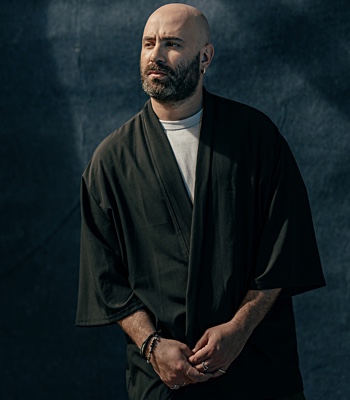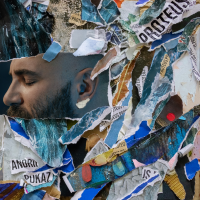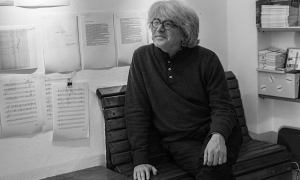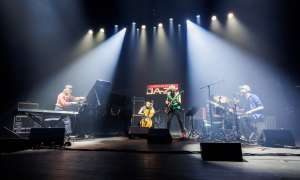Home » Jazz Articles » Interview » Ruth Goller: Basso Profundo
Ruth Goller: Basso Profundo

Detuning my bass allows me to compose a hundred per cent what I’m hearing rather than what I know or what is influenced by muscle memory. It’s liberating, and also frightening, because we improvise a lot. So there’s a lot of chance involved. Which I also like.
—Ruth Goller
When it is put to Goller that were International Anthem interested in selling records they would not be releasing Skyllumina, she bursts into a fit of laughter so loud and so lengthy that her clumsy interviewer struggles to communicate that he means the album is niche, not that it is a dud. It is in fact as far from being a dud as it is possible to imagine: sublimely beautiful and breathtakingly original. (Check the YouTube below).
AAJ is meeting Goller in East London's Total Refreshment Centre (TRC), which opened as a performance space in 2012. In 2018, TRC was banned from putting on any more public performances by a jobsworth local authority following a dispute concerning the sale of alcohol. In the six years until then, it had been a key platform for musicians such as Shabaka Hutchings, Nubya Garcia, Binker and Moses and London's underground jazz scene in general. It had also been a London base for likeminded visiting Americans, notably including International Anthem's Jaimie Branch and Makaya McCraven. With a shared world view, the links between TRC and International Anthem were and continue to be strong.
Today TRC functions in the main as a rehearsal space for musicians, its upper floors divided into variously sized studios. One of those rehearsing there on the day AAJ talks to Goller is Alabaster DePlume, who leads one of several bands in which Goller plays. One day the venue's spacious ground floor may again put on public performances, but "don't hold your breath" is the message from the management team.
Goller, an Italian-born onetime punk bassist who has been defying orthodoxy since she morphed into a jazz musician, came to attention in Acoustic Ladyland alongside tenor saxophonist Pete Wareham and drummer Sebastian Rochford. That was in 2007. The band was the standard bearer for what became known as "jazz punk," although its sound was closer to metal than classic punk. In 2011, Acoustic Ladyland disbanded and some of its members, including Goller and Wareham, reformed as Melt Yourself Down; other members were Shabaka Hutchings and drummer Tom Skinner. There is not enough space here to recite all the bands Goller has been associated with since then, but the list is as strewn with a-list collaborators as it is lengthy.
Given her achievements and the high regard in which she is held by her peers, it is surprising that it took Goller until 2021 to release an album under her own name. Anyway, for many listeners, that year's Skylla (Vula Viel) came as a shock. Intimate and dreamlike, the disc was far away from the thunderous bass-guitar and cage-rattling jazz that are Goller's trademarks. It was also beyond category. Goller played double bass and electric bass and, with Alice Grant and Lauren Kinsella, was one of three singers. There were no other musicians.
Skyllumina is chapter two, developing the Skylla vibe with some headline tweaks. This time, on all but one track where Kinsella returns, Goller takes all the vocals. She has also added a drummer, in fact nine drummers (including Rochford and Skinner), one featured on each track.
"I felt the first album was very strong sonically and I wanted to keep that sound but I also wanted to develop it," says Goller. "I started to think about adding other instruments. I thought of a string quartet, then saxophones. And then I thought, you know what, I really like playing with drums. Then I thought it's not just drums, I could add the whole percussion thing, including tuned percussion. And I started thinking of Jim Hart and his vibraphone and hearing all those overtones in it. And Will Glaser, because he really loves gongs, he's got some amazing gongs. Other people just played kit drums. I'd played with all of them before, except Frank Rosaly. The guys at International Anthem said he would be great. I listened to some of his stuff and I really liked his playing."
Taking on the new album's vocals was a leap for Goller. "I still don't see myself as a singer really. I feel like I have a sound and I have an identity but I feel like I'm a bassist. I don't know anything about vocal technique. It's intuitive for me. Sometimes I feel like I should learn how to do singing but there's something also within me that enjoys the fragility of not always being really on top of things. And sometimes my voice might break and it might not come out the way I have planned it, and I actually really enjoy those moments. It's childlike, like snapping photos without knowing what you're doing."
Key to the artistic success of Skylla and Skyllumina is Goller's unusual creative process centering on her detuned bass. "I love composing on instruments I don't know how to play or composing on detuned bass," she says. "Because when I've got my bass tuned in the standard way I know it so well my fingers almost move as they are used to moving. I'm guided by what I know rather than what I hear. Muscle memory is a totally real thing. Detuning allows me to compose something that is a hundred per cent what I'm hearing, rather than what I know or what I've learned at college or so on.
"The way I do it, I may just tune one string slightly sharp or slightly flat. At the beginning it makes you feel a little bit wobbly. And, you know those paintings where you just look through them and at first you can't see anything and then it becomes clear, for me the feeling is a little bit like that. Suddenly it all makes sense. It's liberating and also frightening, because when we play live we improvise more than we do on record. And suddenly it's like you're playing an instrument you've never played before. So there's a lot of chance in there. Which is also something I like, because there are no mistakes, you do something and sometimes it may be what you're hearing and sometimes it may not be at all what you were hearing. But it may be even better than what you are imagining."
Because she was working with drummers and percussionists on Skyllumina, did Goller make any changes to her writing process? "With most of the drummers I wrote the tune and recorded it the same as I did on the first record," she says. "Then sent them the finished track—bass and vocals—and said do whatever you want with it, because I wanted their sound. I told them don't play heavy metal on it, not that they would have done anyway. I wanted to give them as little instruction as possible, let them improvise over it.
"There was an exception on the two tracks with tuned percussion. I didn't know the tuning so I wanted to get the percussion first. I asked Jim [Hart] and Will [Slater] to each send me five minutes of improvisation, to play whatever for five minutes. They sent those to me and I listened to it and I cut them up and edited them into tunes, and then wrote the bass and vocals on top of that."
Talking to Goller brought to mind something Miles Davis said to Wayne Shorter in the mid 1960s: "Don't play what you know, play what you don't know." Goller's muscle memory-defying detuned bass, and her acceptance of a role for chance in her music, gives Skyllumina an edge-of-the-seat thrill which, in tandem with its otherworldly vibe, is something rare and to be relished. Roll on her taking it on the road.
Ruth Goller: Eight Important Albums
This was the list I chose yesterday, today it might be a bit different. But I thought about it carefully. I was thinking about bass players and drummers as you suggested and I was thinking about albums that have really influenced me as a musician at some point in my life. I tried to choose a variety as well, as I like so many different styles of music. I think it's a good reflection of what I have listened to.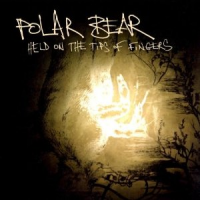 Polar Bear
Polar BearHeld On The Tips Of Fingers
Babel
2005
I started playing with Seb [Rochford, drummer] about the time this was recorded. He was a very big influence on me. He got me using a pick again, which I'd come up on before going to college, but had been denying myself because there's a sort of stigma attached to it. Seb made me realise I should play how I want to play, do things in a way that feels good to me. I have to thank him a lot for where I am musically today. And I love his drumming so much and his writing and him as a person. So this is a very important album for me.
 Charlie Haden & Hank Jones
Charlie Haden & Hank JonesSteal Away
Verve
1995
I feel very emotional listening to this record. And Charlie Haden is one of my most favorite bass players. I love everything he does. And those songs as well. I'm really into gospel tunes. It's very beautiful.
 Squarepusher
SquarepusherGo Plastic
Warp
2001
His bass playing is off the scale but I'm more into him for his productions. This record particularly. I've listened to it a lot. I always discover some new facet every time I play it.
 Clown Core
Clown CoreVan
Self Released
2020
I listen to this a lot. They're a sort of heavy metal saxophone and drum duo from the States. I went to see them when they played in London a few months ago. They're very out. It's the punk side of me that likes this sort of stuff.
 Itiberê Orquestra Familia
Itiberê Orquestra Familia Pedro Do Espia
Far Out
2018
I've listened to a lot of Brazilian music in my life. I was super into Hermeto [Pascoal] who Itiberê [Zwarg] has played with for decades. His bass playing is unique and I'm into this album a lot.
 Lightning Bolt
Lightning Bolt Sonic Citadel
Thrill Jockey
2019
Another hardcore band. I enjoy their energy. I've never seen them live but I really want to go and see them. The kind of drum and bass duo like that, I would love to do that.
 Marc Ribot's Ceramic Dog
Marc Ribot's Ceramic Dog Connection
Yellowbird
2023
I saw them the other day and I thought they were brilliant. I have listened to the record a lot, too. And I love Shahzad Ismaily, the bassist. He's a very deep musician. Anything he touches is special. He's really brilliant. I saw them at the Jazz Café recently and I realized for the first time that Marc Ribot was also using a detuning technique.
 Bill Frisell & Thomas Morgan
Bill Frisell & Thomas Morgan Small Town
ECM
2017
I love Thomas Morgan's playing so much and I love Bill Frisell so much. Those two together, yes! They make so much sense to me. I listen to this album a lot.
Tags
PREVIOUS / NEXT
Support All About Jazz
 All About Jazz has been a pillar of jazz since 1995, championing it as an art form and, more importantly, supporting the musicians who make it. Our enduring commitment has made "AAJ" one of the most culturally important websites of its kind, read by hundreds of thousands of fans, musicians and industry figures every month.
All About Jazz has been a pillar of jazz since 1995, championing it as an art form and, more importantly, supporting the musicians who make it. Our enduring commitment has made "AAJ" one of the most culturally important websites of its kind, read by hundreds of thousands of fans, musicians and industry figures every month.





